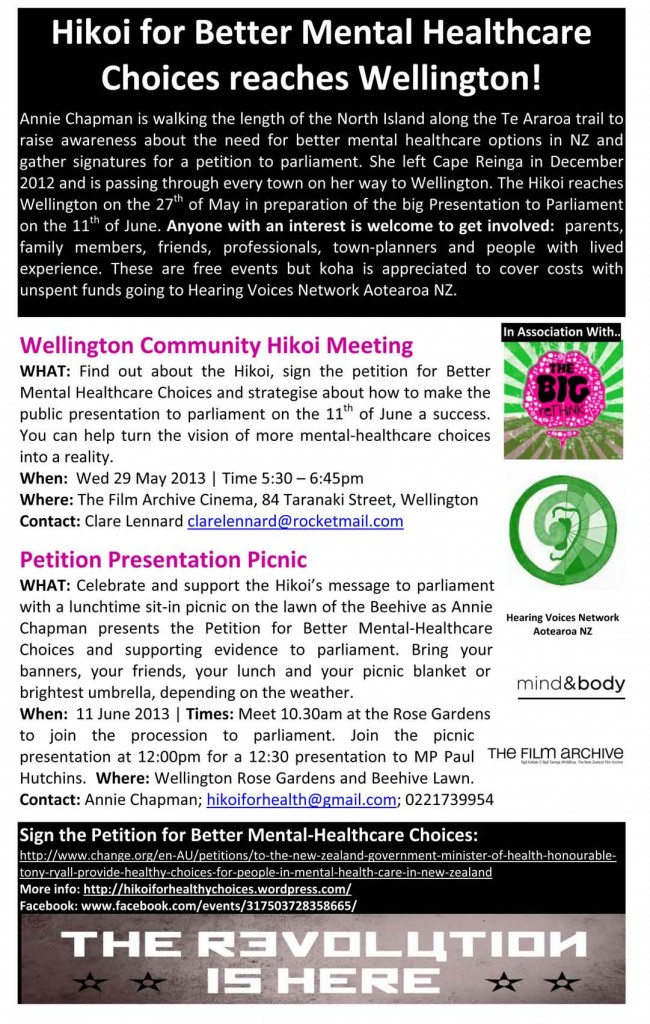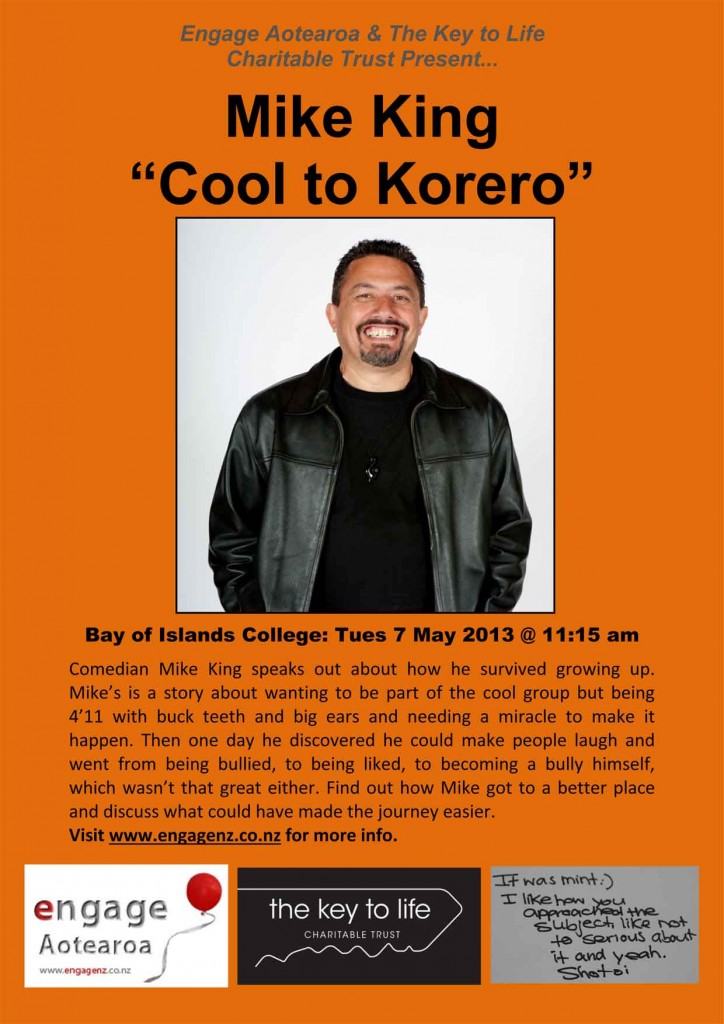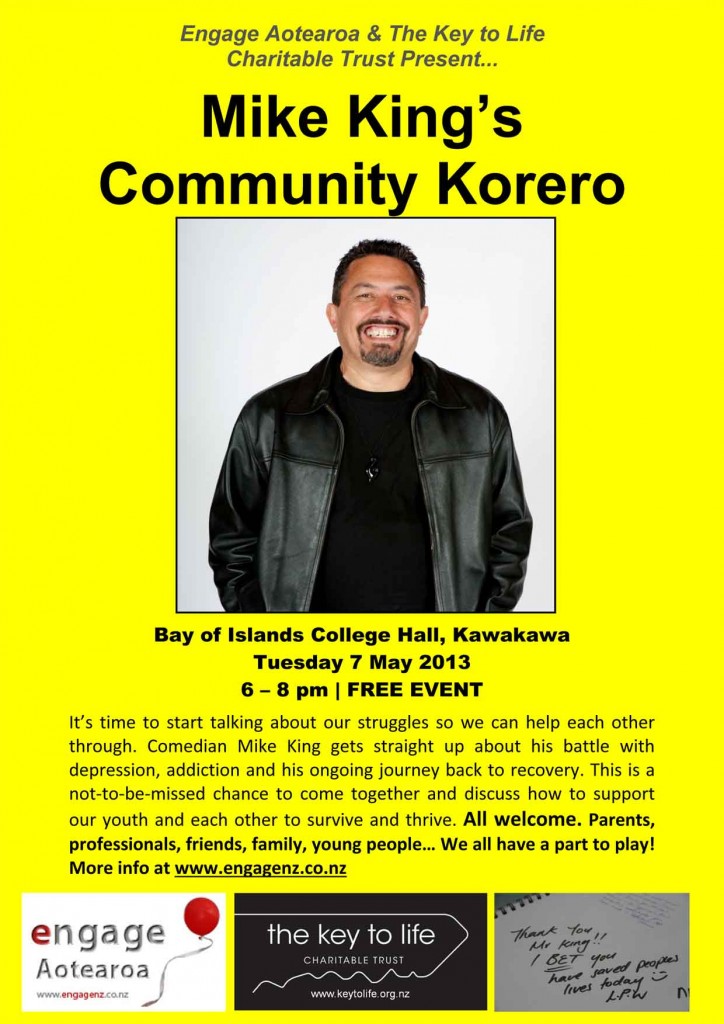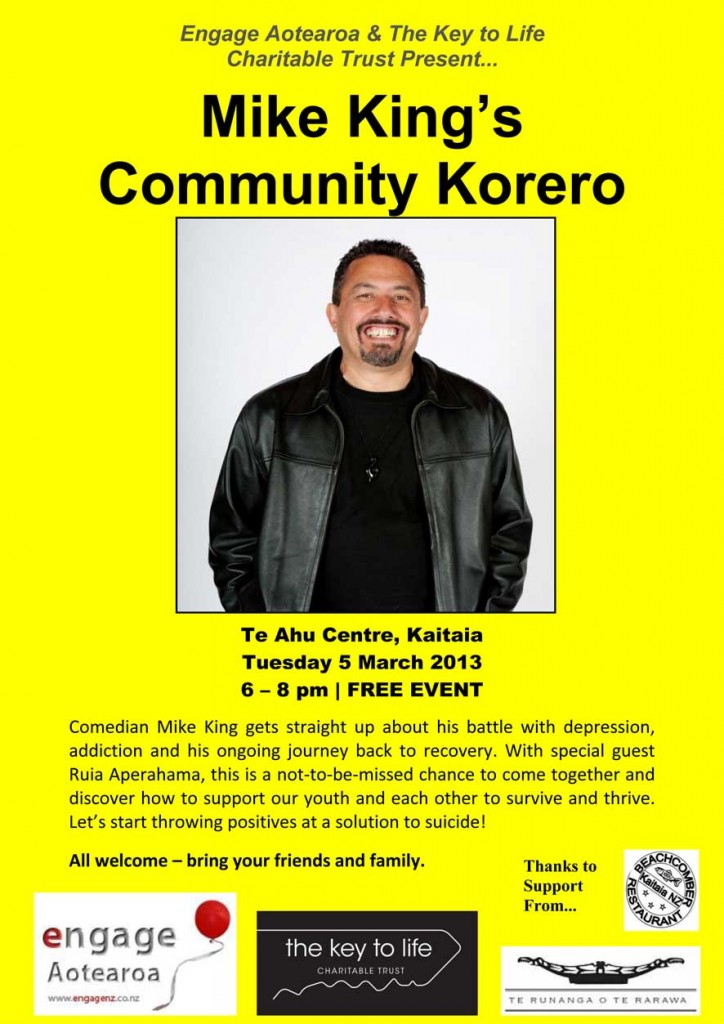Category Archives: People With Disabilities
Hikoi for Better Mental Healthcare Choices in NZ: Schedule April – May
Annie Chapman is walking the length of the north island following the Te Araroa trail to raise awareness of the need for better mental-healthcare choices in NZ. She’s on a mission to take a petition to parliament seeking improved options for people using public mental health services across the country. Across April and May she’ll stop off at a range of different towns to touch base with locals and collect signatures.
Itinerary for April and May 2013
- Taumarunui 5 April
- Whanganui 22/23 April
- Fielding 12th May
- Palmerston North 14th May
- Otaki 21st May
- Paraparaumu 24th May
- Porirua 28th May
Times and venues for Community Hikoi Meetings coming soon.
If you are interested in organising a Hikoi Meeting for your group or community contact Annie Chapman’s new volunteer Hikoi coordinator, Miriam Larsen-Barr by emailing admin@engagenz.co.nz
Keep yourself in the loop at the official Facebook event.
And don’t forget to sign and share the petition!
If you’d like to know a bit more about what this Hikoi is all about, please click here to watch a short video taken of the Hikoi Meeting in Whangarei.
The C Word: C is For Consumer | New Blog Promotes Discussion
An important new forum for strengthening self-determination in mental-health recovery has been launched on the Changing Minds website – a brand new blog called The C Word.
The latest blog post on ‘The C Word’ was released on Friday the 15th of March, and this time the blogger tackles the word ‘Consumer’ and ideas of self-identification:
“Working in what is considered a “consumer” role, most people would assume that I identify as a “consumer”. But I don’t. Put simply, I just can’t identify with that term, and to be honest I feel the same way when it comes to alternatives such as “service-user”.
I choose instead to identify as a person.
I’ve had experiences in my life that have lead me to work in the mental health and addictions sector. These experiences probably enable me to work in this sector more effectively, because I bring personal knowledge as well as professional knowledge to my work. I don’t feel that I should need to share those life experiences to prove my validity as a humanitarian and as an asset to the community sector. I’m a person – a person with a strong sense of social justice and who believes that all human beings should be free from harm and treated with fairness and respect. ”
Info Refresher: The Disability Allowance
The Disability Allowance is a weekly payment to help people meet the costs associated with a disability or health condition (including mental-health conditions). You can find out more by following the link below. You might be surprised to find out just how many things you can get help with if you live with the effects of a health condition.
About the Disability Allowance
The Disability Allowance is a weekly payment for people of all ages who have a disability or ongoing health condition and need help with the additional costs directly associated with that condition.
It is available to people who qualify for a Community Services Card including those on a benefit or people who are working. There is an income test. An application can also be made on behalf of a child if they are aged 18 years or under and financially dependent on the person who is making the application.
To qualify for Disability Allowance the person must:
have a disability or health condition that is likely to last at least six months have regular, ongoing costs because of a disability which are not fully covered by another agency are a New Zealand citizen or permanent resident normally live in New Zealand and intend to stay here meet the income and asset test.
Allowable costs covered by a Disability Allowance
Following are some examples of costs that a Disability Allowance may be paid for; noting that the cost must be directly related to the person’s disability:
Alternative treatment: must be supported by a medical practitioner as being necessary to be publically funded for the person’s condition, and the treatment provided or supervised by a health practitioner (under the HPCAA).
Ambulance fees and subscriptions: when a person is required to pay ambulance fees or subscription fees on an annual on-going basis.
Authorised consumables: can cover the ongoing additional cost of consumable items needed by a person, eg hearing aids, vet’s fees etc for guide dogs, incontinence pads (if they are not provided through Health).
Clothing: for additional clothing costs that a person has which may arise because of greater frequency of washing, wear and tear resulting from use of a prosthetic aid or wheelchair or the need to have clothes or shoes made-to-measure.
Counselling: for counselling fees if the need for counselling is directly related to the person’s disability. It is limited to 10 sessions with the opportunity for some additional sessions if clinically indicated (uncommon).
Day care for the elderly disabled: to help meet the costs of an elderly disabled person (usually aged 65 or over) to attend a day care centre, and/or the cost of transport to the centre.
Gardening, lawns and outside window cleaning: covers the costs of gardening, lawn-mowing, and outside window cleaning for the person’s own home or private residence where the person or another resident in the home is unable to do these tasks themselves.
Gym and swimming pool fees: may be paid when the exercise activities are directly related to a person’s disability and will have a therapeutic value.
Medical alarms: to cover the costs of medical alarm rental and monitoring if a medical alarm is necessary for normal daily living and without it, the person’s life or health would be put at risk, or their disability would be aggravated.
Medical fees: to cover the cost of appointments with general practitioners, specialists or hospital fees if the costs are additional and ongoing. This can also include fees for the some other health services (if a registered medical practitioner verifies the need and its relationship to the documented disability or health condition), for example occupational therapy, physiotherapy, audiology, podiatry or dental services.
Pharmaceutical charges: to cover the costs of regular and ongoing pharmaceutical charges. Note: It is generally only paid to assist with the cost of pharmaceutical products that are subsidised or partially subsidised under the New Zealand Public Health and Disability Act.
Power, gas and heating: for the additional electricity, gas or heating costs that a person has. It is for the costs over and above the normal power consumption of similar-sized households.
Rental equipment: for necessary rental equipment when the client has a need for the item or service but can’t receive funding through the District Health Board or another state funded agency and their life or health would be put at risk, or their disability aggravated if they could not hire the equipment.
Special foods: to cover the additional costs of special foods, ie for costs over and above the normal cost of food. Vitamins, supplements, herbal remedies and minerals can also be included when they are recommended as necessary for the management of the condition.
Telephone: for telephone costs to a person with a disability only when the ongoing cost of the telephone is directly related to the person’s disability.
Transport – disability: for additional travel costs that a person has because of their disability. These additional travel costs can be incurred when a person with a disability is carrying out everyday activities. Examples of everyday activities may include (but is not limited to) shopping, vocational services and work.
Transport – personal health: to cover the costs of regular travel to a health practitioner for supervision or treatment of the person’s disability.
Funded New Zealand Sign Language Interpreters for Deaf Parents
The Ministry of Education is now funding New Zealand Sign Language Interpreters for Deaf parents so they can contribute and participate in their children’s core education activities while their children are attending primary and secondary school.
This service covers:
- formal parent-teacher meetings
- Individual Education Plan meetings
- attendance at prize giving/special assemblies
- attendance at any additional meetings with school staff where any aspect of a child’s education is being discussed
- attendance at school enrolment meetings.
For information about the service go to: http://www.isign.co.nz/services/funding, or contact Carolyn Grace, phone 04 463 8953 or email carolyn.grace@minedu.govt.nz .
Hikoi for reTHiNK of Mental-Healthcare Choices Arriving in Auckland
One Woman Walking: Hikoi for a Big reTHiNK of Mental Healthcare Choices
Annie Chapman is on a hikoi across the length of the North Island to raise awareness about the need for better mental healthcare choices to be made available to service-users in New Zealand.
“I have ceased to be surprised now by how almost everyone I talk to about why I am walking has a story to tell of friends or loved ones in need, utterly failed by the mental health system.” ~ Annie Chapman, 21 December 2012
Annie Chapman will be in Auckland from the 14th – 21st February 2013 (and in fact she may arrive a few days earlier than this).
So far the Auckland events in place are:
• Saturday morning, 16th Feb, from 10 am til 12 noon at Morra Hall, Waiheke. Note: there has been a change of venue to allow for a more formal setting. Instead of Ostend Market as originally planned, Annie Chapman will now be at Morra Hall, Oneroa, Waiheke
• A meeting on 15th February with colleagues of Brigitte Sistig re Yoga and Depression
• A second radio interview with “Take it from Us” (Feb 19)
• A screening/talk of Jim Marbrook’s film “Mental Notes” as a fund-raiser on the 17th of February at Connect SR in Glenfield.
If you have any questions or suggestions of other good possible places to meet, speak or be interviewed by media, please contact Annie direct on 027 4272644 or Hikoiforhealth@gmail.com
Find out more on the official Facebook Page
Help spread the word – invite your friends to the Facebook Event
Mental Health Commissioner Seeks Service-User and Whanau Feedback: Survey Online Now
The Mental Health Commission are running a service-user feedback survey, which can be found at: http://www.surveymonkey.com/s/3HCNGRQ
This survey is for consumers only, and is totally anonymous. People who are family members or supporters of people using services are also able to complete the survey.
It will provide feedback to the Commissioner prior to their community meetings which begin in Auckland on the 15th of February.
If you can’t make it to the community meetings, this survey is your chance to make sure your experiences as a person using mental-health and addictions services are heard by our national policy-makers and funding bodies.
Community Resources Directory Updates
The Community Resources Directory was updated on Christmas Eve and again on the 27th of January.
What’s new in the Community Resources Directory?
- Sub-sections for National, Upper North Island, Lower North Island and South Island services have been added where information is available. Future updates will continue to expand these regional sub-sections until the Directory becomes a nation-wide resource.
- A new combined Child, Youth and Family/Whanau section
- New psychotherapy, counselling and psychologist services added for Christchurch and Auckland
Coming Soon
- Crisis Lines section
- Anger Management section
- Resources from the Gisborne region added to each section (thanks to pamphlets collected on a recent trip to the area).
Make the resource work for you and your people!
- Tell us about the mental-health resources in your region!
- Tell us about your service and the resources you use!
Email Engage Aotearoa and we will include the info in our next update.
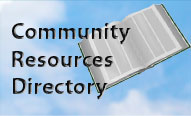
The Community Resources Directory makes it easy for people to find the recovery resources they need.
It is designed to be freely downloaded and shared.
If you are a service provider, you can help empower your service-users by making a printed copy of The Directory available in your waiting room.

